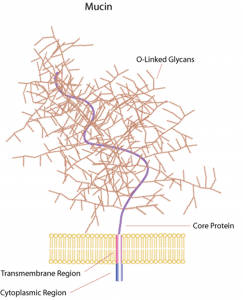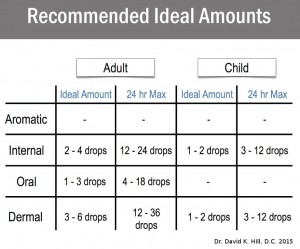Let’s talk about mucus. Yummy! Mucous membranes form a protective barrier on the surface of all hollow organs that open to the outside of the body. Mucus
does a great job at protecting the underlying mucous membranes, which themselves consist of rapidly regenerating epithelial cells. (1)
Mucous membranes produce a variety of protective substances, including mucin. Mucin is a glycosylated protein with the unique ability to retain water and form a gel-like structure we often call mucus. Mucus adheres to almost everything. Mucus has three main purposes: protect the body’s cells, stick to dirt and microbes, and mix with food to help it move smoothly through the digestive tract. Mucus is continuously replaced by the cells that produce it. (2-4)
The mucous membranes important to essential oil usage are those that line the respiratory and digestive tracts. Mucous membranes in these areas serve different functions than mucous membranes elsewhere in the body. Some fear that using essential oils aromatically, orally, or internally will damage mucous membranes. That fear is unfounded after a quick examination of how they work and what research has found.
A number of research studies have examined how essential oils interact with mucus and mucous membranes; essential oils have shown remarkably positive effects on mucous membranes. For example, several different essential oils have been shown to increase digestive tract mucus production. (2,5-7) In the digestive tract, increased mucus production is a good thing, leading to increased protection for underlying mucous membrane cells. Conversely, mucus production in the respiratory tract must be more balanced to avoid congestion. (8) Some essential oils have been shown to meter the production of mucus by regulating mucin genes. (9,10)
When essential oils are ingested, they don’t just sit in the stomach. Research has shown that lipophilic substances bind to certain regions of mucin. (4) Essential oils are lipophilic substances, and likely will also bind to mucin. After binding to mucin, they will travel through the digestive tract until they are absorbed into the blood stream. When taking essential oils aromatically, orally, or internally, you don’t need to worry about them harming mucous membranes, as long as you are staying within appropriate usage guidelines. The body has developed great methods for utilizing essential oils in a safe and effective manner.
References:
- Cone RA. Barrier properties of mucus.Adv Drug Deliv Rev. 2009;61(2):75-85.
- Sigurdsson HH, Kirch J, Lehr C-M. Mucus as a barrier to lipophilic drugs.Int J Pharm. 2013;453(1):56-64.
- Marieb E, Hoehn K.Human Anatomy & Physiology. Boston: Pearson; 2013.
- Čapkovičová A, Maková Z, Piešová E, Alves A, Faix Š, Faixová Z. Evaluation of the effects of Salvia officinalis essential oil on plasma biochemistry, gut mucus and quantity of acidic and neutral mucins in the chicken gut.Acta Vet Brno. 2014;64(1):138-148.
- Coelho-de-Souza AN, Lahlou S, Barreto JEF, et al. Essential oil of Croton zehntneri and its major constituent anethole display gastroprotective effect by increasing the surface mucous layer.Fundam Clin Pharmacol. 2013;27(3):288-298.
- Moraes TM, Kushima H, Moleiro FC, et al. Effects of limonene and essential oil from Citrus aurantium on gastric mucosa: role of prostaglandins and gastric mucus secretion.Chem Biol Interact. 2009;180(3):499-505.
- Moraes TM, Rozza AL, Kushima H, Pellizzon CH, Rocha LRM, Hiruma-Lima CA. Healing actions of essential oils from Citrus aurantium and d-limonene in the gastric mucosa: the roles of VEGF, PCNA, and COX-2 in cell proliferation.J Med Food. 2013;16(12):1162-1167.
- Voynow JA, Rubin BK. Mucins, mucus, and sputum.Chest. 2009;135(2):505-512.
- Ueno-Iio T, Shibakura M, Yokota K, et al. Lavender essential oil inhalation suppresses allergic airway inflammation and mucous cell hyperplasia in a murine model of asthma.Life Sci. 2014;108(2):109-115.
- Sudhoff H, Klenke C, Greiner JFW, et al. 1,8-Cineol Reduces Mucus-Production in a Novel Human Ex Vivo Model of Late Rhinosinusitis.PLoS One. 2015;10(7):e0133040.




